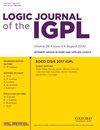二元模态逻辑与一元模态逻辑
IF 0.8
4区 数学
Q2 LOGIC
引用次数: 0
摘要
摘要标准一元模态逻辑与二元模态逻辑,即具有一个二元算子的模态逻辑,当在二元边的基本公理化上加一个公理$U$时,证明了它们是彼此的定义扩展。这加强了我们以前的成果。由此可见,所有扩展经典模态逻辑的一元模态逻辑,换句话说,所有具有邻域语义的一元模态逻辑,都可以等效地视为二元模态逻辑。这特别适用于标准模态逻辑,它可以以二进制形式给出简单的自然公理化。我们在逻辑k中说明了这一点。我们称这种逻辑为一元模态逻辑的二元展开。这样的二进制展开比公理$U$给出的要多得多。我们开始研究这些展开式的性质,特别是一个逻辑的极大二进制展开式。我们的结果直接暗示了所有具有标准模态伴侣的子直觉逻辑和超直觉逻辑也具有二元模态伴侣。后者也适用于我们之前论文的弱次直觉逻辑WF。这个逻辑似乎没有一元模态伴生。本文章由计算机程序翻译,如有差异,请以英文原文为准。
Binary modal logic and unary modal logic
Abstract Standard unary modal logic and binary modal logic, i.e. modal logic with one binary operator, are shown to be definitional extensions of one another when an additional axiom $U$ is added to the basic axiomatization of the binary side. This is a strengthening of our previous results. It follows that all unary modal logics extending Classical Modal Logic, in other words all unary modal logics with a neighborhood semantics, can equivalently be seen as binary modal logics. This in particular applies to standard modal logics, which can be given simple natural axiomatizations in binary form. We illustrate this in the logic K. We call such logics binary expansions of the unary modal logics. There are many more such binary expansions than the ones given by the axiom $U$. We initiate an investigation of the properties of these expansions and in particular of the maximal binary expansions of a logic. Our results directly imply that all sub- and superintuitionistic logics with a standard modal companion also have binary modal companions. The latter also applies to the weak subintuitionistic logic WF of our previous papers. This logic doesn’t seem to have a unary modal companion.
求助全文
通过发布文献求助,成功后即可免费获取论文全文。
去求助
来源期刊
CiteScore
2.60
自引率
10.00%
发文量
76
审稿时长
6-12 weeks
期刊介绍:
Logic Journal of the IGPL publishes papers in all areas of pure and applied logic, including pure logical systems, proof theory, model theory, recursion theory, type theory, nonclassical logics, nonmonotonic logic, numerical and uncertainty reasoning, logic and AI, foundations of logic programming, logic and computation, logic and language, and logic engineering.
Logic Journal of the IGPL is published under licence from Professor Dov Gabbay as owner of the journal.

 求助内容:
求助内容: 应助结果提醒方式:
应助结果提醒方式:


